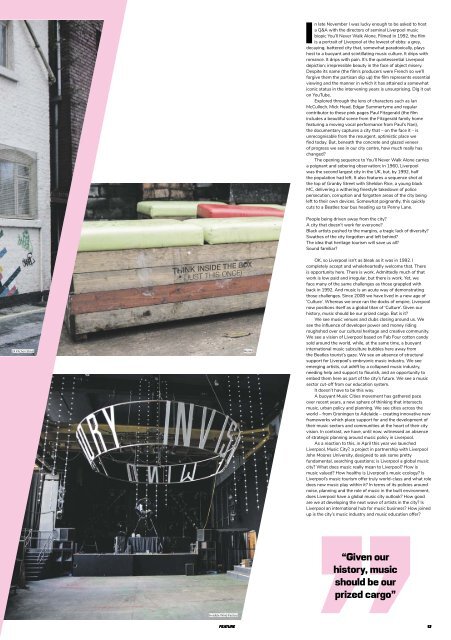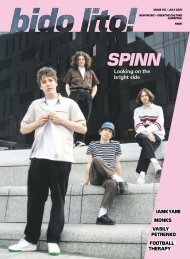Issue 84 / Dec 2017/Jan 2018
December 2017/January 2018 issue of Bido Lito! Featuring LO FIVE, TAYÁ, NICK POWER, MAC DEMARCO, LIVERPOOL MUSIC WEEK 2017 REVIEW and much more. Plus a special look at our need for space and independent venues, coinciding with a report into the health of Liverpool's music infrastructure.
December 2017/January 2018 issue of Bido Lito! Featuring LO FIVE, TAYÁ, NICK POWER, MAC DEMARCO, LIVERPOOL MUSIC WEEK 2017 REVIEW and much more. Plus a special look at our need for space and independent venues, coinciding with a report into the health of Liverpool's music infrastructure.
You also want an ePaper? Increase the reach of your titles
YUMPU automatically turns print PDFs into web optimized ePapers that Google loves.
In late November I was lucky enough to be asked to host<br />
a Q&A with the directors of seminal Liverpool music<br />
biopic You’ll Never Walk Alone. Filmed in 1992, the film<br />
is a portrait of Liverpool at the lowest of ebbs: a grey,<br />
decaying, battered city that, somewhat paradoxically, plays<br />
host to a buoyant and scintillating music culture. It drips with<br />
romance. It drips with pain. It’s the quintessential Liverpool<br />
depiction; irrepressible beauty in the face of abject misery.<br />
Despite its name (the film’s producers were French so we’ll<br />
forgive them the partisan slip up) the film represents essential<br />
viewing and the manner in which it has attained a somewhat<br />
iconic status in the intervening years is unsurprising. Dig it out<br />
on YouTube.<br />
Explored through the lens of characters such as Ian<br />
McCulloch, Mick Head, Edgar Summertyme and regular<br />
contributor to these pink pages Paul Fitzgerald (the film<br />
includes a beautiful scene from the Fitzgerald family home<br />
featuring a moving vocal performance from Paul’s Nan),<br />
the documentary captures a city that – on the face it – is<br />
unrecognisable from the resurgent, optimistic place we<br />
find today. But, beneath the concrete and glazed veneer<br />
of progress we see in our city centre, how much really has<br />
changed?<br />
The opening sequence to You’ll Never Walk Alone carries<br />
a poignant and sobering observation; in 1960, Liverpool<br />
was the second largest city in the UK, but, by 1992, half<br />
the population had left. It also features a sequence shot at<br />
the top of Granby Street with Sheldon Rice, a young black<br />
MC, delivering a withering freestyle takedown of police<br />
persecution, corruption and forgotten areas of the city being<br />
left to their own devices. Somewhat poignantly, this quickly<br />
cuts to a Beatles tour bus heading up to Penny Lane.<br />
People being driven away from the city?<br />
A city that doesn’t work for everyone?<br />
Black artists pushed to the margins, a tragic lack of diversity?<br />
Swathes of the city forgotten and left behind?<br />
The idea that heritage tourism will save us all?<br />
Sound familiar?<br />
24 Kitchen Street Meraki<br />
OK, so Liverpool isn’t as bleak as it was in 1992. I<br />
completely accept and wholeheartedly welcome that. There<br />
is opportunity here. There is work. Admittedly much of that<br />
work is low paid and irregular, but there is work. Yet, we<br />
face many of the same challenges as those grappled with<br />
back in 1992. And music is an acute way of demonstrating<br />
those challenges. Since 2008 we have lived in a new age of<br />
‘Culture’. Whereas we once ran the docks of empire, Liverpool<br />
now positions itself as a global titan of ‘Culture’. Given our<br />
history, music should be our prized cargo. But is it?<br />
We see music venues and clubs closing around us. We<br />
see the influence of developer power and money riding<br />
roughshod over our cultural heritage and creative community.<br />
We see a vision of Liverpool based on Fab Four cotton candy<br />
sold around the world, while, at the same time, a buoyant<br />
international music subculture bubbles here away from<br />
the Beatles tourist’s gaze. We see an absence of structural<br />
support for Liverpool’s embryonic music industry. We see<br />
emerging artists, cut adrift by a collapsed music industry,<br />
needing help and support to flourish, and an opportunity to<br />
embed them here as part of the city’s future. We see a music<br />
sector cut-off from our education system.<br />
It doesn’t have to be this way.<br />
A buoyant Music Cities movement has gathered pace<br />
over recent years, a new sphere of thinking that intersects<br />
music, urban policy and planning. We see cities across the<br />
world – from Groningen to Adelaide – creating innovative new<br />
frameworks which place support for and the development of<br />
their music sectors and communities at the heart of their city<br />
vision. In contrast, we have, until now, witnessed an absence<br />
of strategic planning around music policy in Liverpool.<br />
As a reaction to this, in April this year we launched<br />
Liverpool, Music City?, a project in partnership with Liverpool<br />
John Moores University, designed to ask some pretty<br />
fundamental, searching questions; is Liverpool a global music<br />
city? What does music really mean to Liverpool? How is<br />
music valued? How healthy is Liverpool’s music ecology? Is<br />
Liverpool’s music tourism offer truly world-class and what role<br />
does new music play within it? In terms of its policies around<br />
noise, planning and the role of music in the built environment,<br />
does Liverpool have a global music city outlook? How good<br />
are we at developing the next wave of artists in the city? Is<br />
Liverpool an international hub for music business? How joined<br />
up is the city’s music industry and music education offer?<br />
“Given our<br />
history, music<br />
should be our<br />
prized cargo”<br />
Invisible Wind Factory<br />
FEATURE<br />
13


















